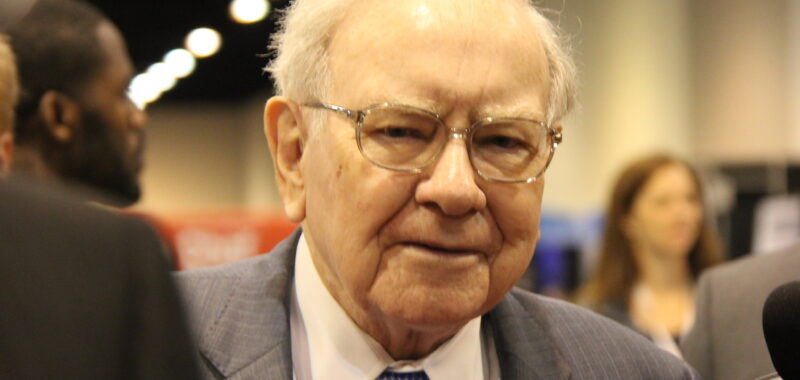Even though the stock market is historically pricey, the Oracle of Omaha is purchasing shares of four brand-name stocks hand over fist.
Arguably no money manager is more closely followed on Wall Street than Berkshire Hathaway (BRK.A 0.12%) (BRK.B -0.23%) CEO Warren Buffett. Aside from being an open book and willingly sharing the traits he looks for when putting his company’s capital to work, the Oracle of Omaha has overseen a greater than 5,600,000% cumulative return in his company’s Class A shares (BRK.A) since taking over in the mid-1960s.
Although Buffett is an unabashed optimist who has frequently cautioned investors to not bet against America, his short-term actions don’t always align with his long-term ethos.

Berkshire Hathaway CEO Warren Buffett. Image source: The Motley Fool.
Over a seven-quarter span — which is likely to become eight, given Berkshire’s aggressive selling of Bank of America shares in the September-ended quarter — Warren Buffett and his top investment aides, Todd Combs and Ted Weschler, have collectively sold close to $132 billion more in stocks than they’ve purchased. As of June 30, Berkshire’s cash pile, which includes short-term U.S. Treasury bills, stood at a record $276.9 billion.
Without bluntly stating so, Buffett’s actions appear to be a clear warning to Wall Street that the stock market is historically pricey.
Yet in spite of this warning, there are a select few stocks that have caught the Oracle of Omaha’s eye. One of the priciest stock markets in history hasn’t stopped Buffett from piling into the following four unstoppable stocks.
Sirius XM Holdings
First up is satellite-radio operator Sirius XM Holdings (SIRI 1.88%), which merged with Liberty Media’s Sirius XM tracking stock, Liberty Sirius XM Group, in September and conducted a 1-for-10 reverse split.
Between Oct. 9 and Oct. 11, a Form 4 filing with the Securities and Exchange Commission showed that Berkshire had acquired approximately 3.56 million shares of Sirius XM, which increased its existing stake to 108.7 million shares, or roughly 32.1% of the company’s outstanding shares.
Buffett is a big fan of sustainable moats, and this is something Sirius XM definitely brings to the table. As the only licensed satellite-radio operator, Sirius XM is a legal monopoly. While it still has to battle with terrestrial and online radio for listeners, being the only satellite-radio operator affords it superior subscription pricing power.
To build on this point, its sales channels are markedly different than traditional radio operators. Whereas the latter bring in most of their sales from advertising, Sirius XM generated 77% of its net revenue from subscriptions through the first-half of 2024. Subscription revenue is less volatile than enterprise ad spending, which leads to more predictable cash flow for Sirius XM.
The valuation also makes a lot of sense. When Berkshire’s brightest minds, which includes Buffett, purchased shares of Sirius XM less than two weeks ago, it was valued at less than 8 times forward-year earnings and sporting a yield that was closing in on 5%. Buffett is an ardent value investor and appreciates robust capital-return programs.

Image source: Getty Images.
Occidental Petroleum
A second unstoppable stock that undoubtedly has Warren Buffett’s undivided attention is integrated oil and gas goliath Occidental Petroleum (OXY -0.12%). Since 2022 began, Berkshire Hathaway’s position in Occidental has been built from scratch to almost 255.3 million shares.
The Oracle of Omaha doesn’t have over $13 billion put to work in Occidental Petroleum common shares on a whim. More than likely, he and his team believe the spot price of crude oil will remain elevated or head even higher, which would disproportionately benefit Occidental. Though the company does have downstream chemical operations, the bulk of its net sales and operating cash flow can be traced to its higher-margin drilling segment.
The good news for Occidental is that there are well-defined macro factors that can support a sustainably higher price for crude oil. Specifically, multiple years of capital underinvestment by global energy majors during the COVID-19 pandemic, coupled with Russia’s invasion of Ukraine in February 2022, has led to oil supply uncertainty and/or tightness that’s been positive for the spot price of crude oil.
Occidental has also vastly improved what had been a debt-riddled balance sheet following its acquisition of Anadarko in 2019. It closed out June 2024 with $18.4 billion in net long-term debt, which is almost a 50% net-debt reduction since peaking.
The final piece of the puzzle is that Berkshire Hathaway is holding warrants to more than 83.8 million common shares of Occidental that have an exercise price of $59.624 per share. It’s in Buffett’s and Berkshire’s best interest if Occidental’s share price remains well above this exercise price.
Chubb
The third magnificent stock that Warren Buffett can’t stop buying, even amid his warning to Wall Street that value is hard to come by, is property and casualty (P&C) insurer Chubb (CB -0.08%).
While the Oracle of Omaha is typically transparent with his trading activity, he has, on rare occasion, requested confidential treatment for one of more securities when filing Berkshire Hathaway’s quarterly Form 13F. Being able to build a position in one or more securities without unveiling which stock(s) he’s buying can allow Buffett a more advantageous cost basis. In mid-May, Berkshire’s mystery stock was revealed to be Chubb.
Between July 1, 2023, and June 30, 2024, Berkshire’s chief bought more than 27 million shares of Chubb, which are worth roughly $8.2 billion, as of the closing bell on Oct. 17.
The beautiful aspect of the insurance industry is that it’s boring. While catastrophe losses are an inevitability for P&C insurers, they’re usually able to boost premiums in any economic climate. Mother Nature may be unpredictable, but sporting premium pricing power gives Chubb the ability to stay one step ahead.
Chubb is also taking advantage of a notable increase in Treasury yields, which is a function of the Federal Reserve hiking interest rates at the fastest pace in four decades. Insurers invest their float — i.e., the premium payments they collect that aren’t disbursed as claims — in super-safe short-term Treasury bills. Higher yields have lifted interest income for insurers.
Berkshire Hathaway
The fourth unstoppable stock Warren Buffett can’t stop buying, and what can easily be described as his favorite stock to buy, is shares of his own company.
Prior to July 2018, the Oracle of Omaha and right-hand man Charlie Munger (Munger passed away last November) were forced to sit on their hands. Share repurchases were only allowed if Berkshire Hathaway’s shares fell to or below 120% of book value (i.e., no more than 20% above listed book value). However, Berkshire’s stock never fell to this threshold, which meant Buffett and Munger weren’t able to spend a penny on buybacks.
On July 17, 2018, Berkshire’s board of directors amended the rules governing buybacks to give Buffett another tool to bolster shareholder value. As long as Berkshire has at least $30 billion in combined cash, cash equivalents, and U.S. Treasuries on its balance sheet, and Buffett views his company’s stock as intrinsically cheap, repurchases can continue with no ceiling or end date.
Warren Buffett has purchased Class A (BRK.A) and/or Class B (BRK.B) shares for 24 consecutive quarters, totaling almost $78 billion. In other words, Buffett has spent more than twice as much buying shares of his own company’s stock than he did purchasing shares of top holding Apple.
In addition to incrementally increasing the ownership stakes of Berkshire’s shareholders and promoting long-term investing, a steady diet of buybacks should reduce the company’s outstanding share count and provide a boost to its earnings per share (EPS). In short, it’ll make Berkshire Hathaway’s stock more attractive to fundamentally focused investors.

